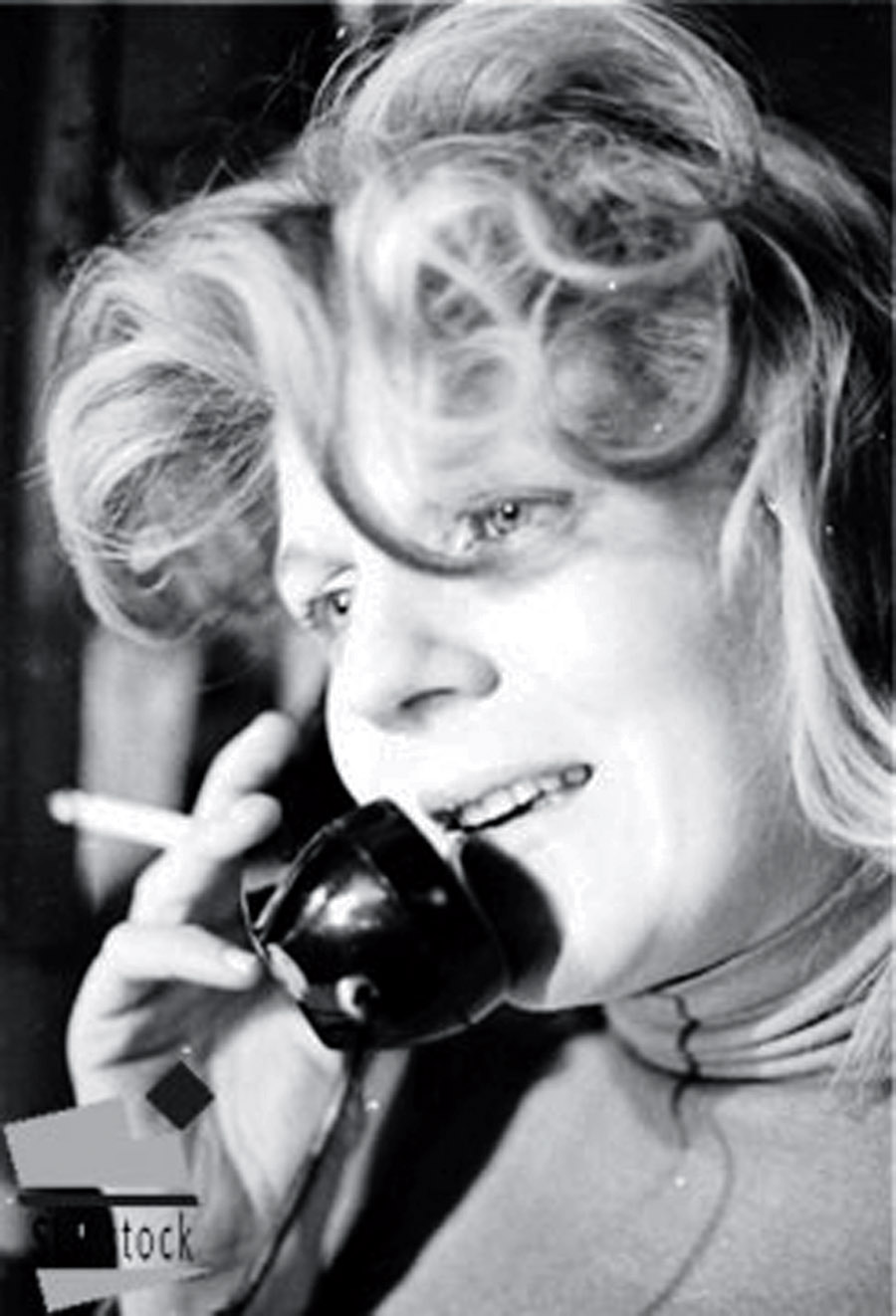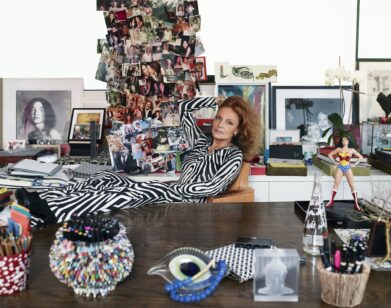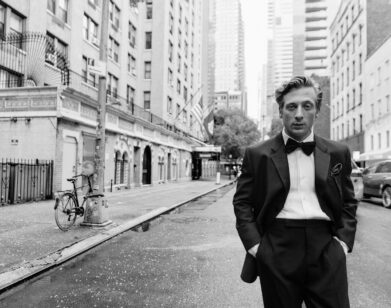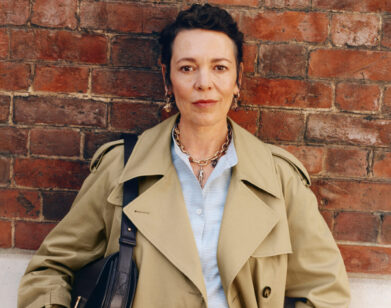Factory Workers Warholites Remember: Brigid Berlin
Vincent Fremont and Brigid Berlin were probably the people closest to Andy for the longest time. Brigid was “B” to Andy’s “A,” in books and in real life his favorite phone friend. She started out as Brigid “Polk” — the amphetamine-shooting superstar in Andy’s movies who was the black sheep of the Berlin family. (Her dad ran the Hearst empire.) She was an artist in her own right, and when she grew up she continued to make art and a lot of crafts, like needlepoint, much of it while working as a receptionist for the Warhol Studio. Vincent also put in some time as receptionist. (He would answer the phone while reading biographies of Hollywood moguls — the early clue as to how he would end up.) The Factory was a place where you could go from sweeping the floor or answering the phone to running the business. He began supervising the Factory’s video and TV projects and then became Andy’s business manager. Today he is the exclusive agent for Andy Warhol’s paintings and drawings, and he manages the career of Brigid, about whom he made the delightful documentary Pie in the Sky (2000). The following conversation is reminiscent of the interviews Brigid “redacted” for Interview in the ’80s.
VINCENT FREMONT: If he were alive, he’d be 80 this August 6. I wonder what he would be doing.
BRIGID BERLIN: Well, I don’t think that Andy would be using a computer. And I don’t know if he could deal with one of these little digital recorders.
FREMONT: I know. It is freaking us both out.
BERLIN: I don’t think he could have dealt with a digital camera that’s the size of a matchbook. But if he had any of this equipment, he’d really have us busy transcribing. It would be insane. The main thing wasn’t really the context of the interview. It was about how big it was.
FREMONT: It was about volume.
BERLIN: Volume and nothing else. One of my most exciting experiences with Andy was when we got our first Xerox machine. We put it in the kitchen, and Andy really thought it was magic. I had my tits down in it with the lid halfway down. One of Andy’s favorite expressions was, “Gee, Brig, isn’t this so great? It’s so John modern.”
FREMONT: I think he would be saying that. He would have people around him able to use the equipment.
BERLIN: It was exciting the first day we got the Polaroid movie camera.
FREMONT: The Polavision, which was useless because it had no audio.
BERLIN: I think that wound up in a time capsule.
FREMONT: Andy liked getting a present, but he’d want to keep it as a collectable immediately.
BERLIN: He didn’t want to open anything that he got because he thought there was a bomb in it, so he’d give it to us to open. He always thought he was going to get poisoned or shot or blown up.
FREMONT: After he died, we went up to his house, and the guest room that used to be empty was floor-to-ceiling with stuff. He was the proverbial pack rat.
BERLIN: His whole dining room was nothing but a bunch of shopping bags filled with batteries for tape recorders.
FREMONT: Time capsules were growing there, too.
BERLIN: They were fucking alive, those time capsules.
FREMONT: Andy’s been gone more than 20 years. Can you imagine 20 more years of time capsules? We had already filled the basement of the Factory to the top, about 15 feet high. It would have been insane.”
BERLIN: I had a full-time job at the Factory at 860 Broadway. I couldn’t wait to get there every morning, and every day I couldn’t wait to leave. I looked at the clock on Union Square, and every year I left five minutes earlier. But at 8:30 A.M. when you would arrive, I’d be standing in the lobby waiting for you because I couldn’t stand being home anymore.
FREMONT: Five of nine was my usual time.
BERLIN: We’d go upstairs, and you would unlock. Then the phone would ring and it would be, [as Andy] “Hi, Brig. What’s new?” And then he’d say, “Is Vincent there?” And I’d say, “He’s in the back.” [as Andy] “Well you’re not throwing out anything are you?” God help us if we threw out a coffee can. Then he’d come in around 12:30 P.M. and sit behind me reading the Post. He’d say, “Well, isn’t this a great story. Why can’t Pat [Hackett] make a script out of this?” I’d say, “What are you talking about?” I didn’t have the Post in front of me. “Well, this is a great murder. Why can’t we do this?”
FREMONT: Or, “They’re so peculiar.”
BERLIN: Or, “All these young kids, they’re doing such great things, and we’re doing nothing.”
FREMONT: He liked youth and he liked the news. I think that Andy would have been with the kids at 80. He would have appreciated anybody creative who was young, and helped them go forward.
BERLIN: We’d be walking around shopping, and we’d carry Interview, and these young kids would stop and want his autograph. And Andy would find somebody cute on the street who asked him for his autograph and say, “Oh, well, come on up for lunch at the Factory.”
FREMONT and BERLIN [in unison]: “We’ll put you on the cover.” [both laugh]
BERLIN: 860 was the most fun of all the Factories because we seemed to be all together, even though Interview was separated by glass doors. I’ll never forget the first day that André Leon Talley came to work. He walks in, in khaki Bermuda shorts and a Panama hat with a madras band, and starts answering the phone. And then Bob [Colacello] started his thing about owning part of Interview and Andy would say, “Well, who does he think he is?” And Bob would say, “Well, look at all the portrait commissions I get him.” Bob did maintain better relationships with the ladies who mattered than Fred [Hughes].
FREMONT: But Fred was instrumental in doing so many things for Andy, businesswise. They had the same aesthetic. But you’re right, Bob learned how to be around the society ladies. He did it very well.
BERLIN: He became friends with all those people like Nancy Reagan and Betsy Bloomingdale and Lynn Wyatt. And Bob still, to this day, maintains every one of those friendships.
FREMONT: It’s hard to project what Andy would be like today because he was so unpredictable. People always ask me what Andy would have painted. I think, with all the scandal that’s gone down over the years, Andy would have been fascinated. And all that world of technology we would have stayed with it. Andy was very curious and he always wanted to know what was going on, and that keeps you young. I’m still trying to emulate him in that sense. Can you imagine how many young artists would have been coming to visit him?
BERLIN: And if I were still working for him, I know that I’d be threatened every day with the pink slip. [as Andy] “How dare she go off to London to lose weight? She can lose weight here.” He’d give me $100 and send me to Altman’s for a box of chocolates and then he’d come back and sit in your office with paper towels, chew them, and spit them into the towels. He would not swallow. And he didn’t understand why I had to go through the act of swallowing.
FREMONT: He wasn’t supposed to eat chocolate because of his gallbladder, which unfortunately was the thing that put him into New York Hospital. Now do you want to talk about what you’ve been doing in the last year or two?
BERLIN: Well . . . I didn’t have a drink for 17 years. I thought my life was pretty good and I was pretty happy. And then three years ago this month, I was just walking the dogs around the block like I did every night and something ticked me off that I wanted fettuccini Alfredo. I went into a restaurant down the block and I had the dogs, and they didn’t want to let me in, but there was this tiny table in front, and I said, “If I sit really near the window, they’re not going to bite anybody. Can I just get this takeout order?” And I ordered a glass of pinot grigio out of nowhere. Santa Margarita. They said, “We don’t have Santa Margarita.” This must have come through my subconscious mind from an ad on television.
When we got our first Xerox machine We put it in the kitchen, and Andy really thought it was magic. BRIGID BERLIN
FREMONT: You’ve struggled with drinking problems . . .
BERLIN: For three years.
FREMONT: I know that’s why you went into rehab last summer. You want to talk about that?
BERLIN: Well, I went to Caron in Pennsylvania. Last August 26. The breeders of my dogs, who I absolutely adore, drove all the way up here to get me. I spent the night with them and the pugs. Then in the morning, they drove me to Caron. I really hated it. There are two things that I hate: getting up at 6 in the morning and making my bed. I’m as neat as a pin, but I will not make beds. Period. I don’t care if I get into them and they’re messy. I just don’t care. I really hated it. This was when they started talking about feelings and agitation, anxiety, anger. I said, “I think that this is the kind of stuff that should be taught to kids in the first grade. I don’t know the difference about anything except I feel that I have a beehive in my chest.” I felt like I had this beehive in my chest with 5 million bees buzzing around and all I wanted to do was let them out of my shoulders and kill everybody. And I said, “The world is fine. But the people in it suck.”
FREMONT: What do you think Andy would have thought of your upcoming visit to Silver Hills tomorrow?
BERLIN: [as Andy] “Are you kidding? You’re spending 50 thousand bucks a year on this, when all you have to do is just not drink?”
FREMONT: If Andy were alive, you would have called him. [as Andy] “I mean, Brig, why are you there? I don’t understand why you can’t just have one drink.”
BERLIN: [as Andy] “Give me that 50 thousand! I mean, can’t you get your father’s portrait done?” That went on for years.
FREMONT: You’re having your second show at John McWhinnie at Glenn Horowitz bookstore in November. In your first show, you showed your Cock Book and the other trip books and some needlepoint. Are you going to be able to take needlepoint into Silver Hill?
BERLIN: Yes. They’ll let me do it, but, when I finish, they’ll take the scissors away from me.
FREMONT: You turn in your scissors at the end of the day?
BERLIN: Apparently there are all these new diseases that I don’t know about. There are people called cutters. They cut themselves.
FREMONT: Do you think Andy would have asked you to write a play about this?
BERLIN: Probably. And David Bowie would be playing me. Andy Warhol’s Rehab. I mean, there are so many stories about rehab, like with Truman.
FREMONT: That’s Truman Capote.
BERLIN: Of course. We’d have those lunches with him at La Petite Marmite. I started to go up to Truman’s every day and work with him. I’m saying to myself, “Well, this is Truman Capote, and he’s reading me all these handwritten manuscripts on legal paper in this perfect handwriting.” Everything he did was perfect. But still I’d have to say, “Read that again. I think it might sound better if you wrote it this way.” I had to say something.
FREMONT: You know how to write.
BERLIN: And then he’d say to me things like, “You see that terrine on the table?” He had this stupid paperweight collection. He’d say, “Guess what’s in there?” And it was a whole terrine of joints. He’d call me up and say he was sick, that he needed food, and I’d race up there and buy all this stuff from the grocery store, and he wouldn’t answer the bell. Finally he’d open the door in his nightshirt and he’d wallpapered his room with Interview covers of himself.
FREMONT: That’s funny. Andy thought you helped Truman.
BERLIN: But Andy would say, “You’re up there all day with Truman? And you’re not taping it?”
FREMONT: [as Andy] “I mean, I can’t believe it, Brigid!”
BERLIN: I’ll never forget two days. One was the day that he was advised that he should get health insurance for everybody at the Factory. He didn’t get it at all that this was going to be better for him in the long run.
FREMONT: And we did get health insurance.
BERLIN: The other day was the day when Fred had made this appointment to discuss Andy’s will. I mean, he really did not want to face that.
FREMONT: I don’t think anybody does. Death was abstract to him. He wasn’t ready to die. He never could discuss that.
BERLIN: I remember at the Factory on 33rd Street, he had this magazine open, and there was a double-paged spread and it had all these little squares of all of the talented people who had died of AIDS. And Andy just looked amazed and said, “This is just too abstract. It’s like they all went to Bloomingdale’s and they never came back.”







